Highly attractive stands – Interview in "Das Musikinstrument"
Adam Hall has recognised that stands are accessories that spend part of their time “in the shadows”. That’s about to change with the new, visually and sensually elegant “Gravity” brand. In an interview with “Das Musikinstrument”, CEO Alexander Pietschmann and Product Manager Robin Henlich discussed the product and marketing strategy of the new brand – and provided insight into the philosophy of the young Hessian company.
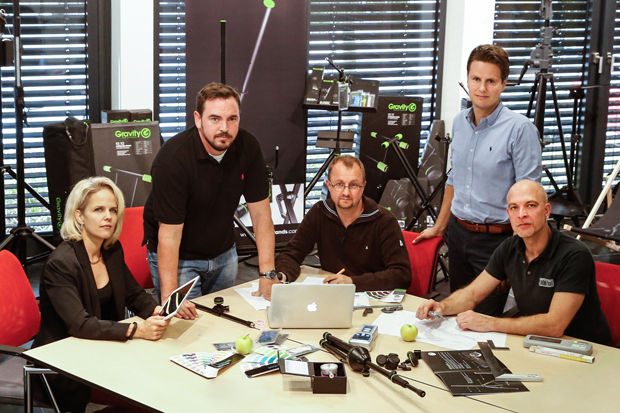
Adam Hall is presenting a new brand of stands with its Gravity range. How did it happen?
Alexander Pietschmann: Mechanics and metal processing are a part of our corporate DNA, as well as event technology. We have acquired a high level of expertise through our more than 40 years of development experience in flight case fittings and stage accessories. But that’s not all: We believe that Adam Hall understands particularly well how consumers use the products. This sets us apart from all the others, who only represent one type of product. We view the context, i.e. how the products are used, as an important part of development work. We consider what kind of environment they are used in, and how users move them around on the stage. We launched the Gravity project three years ago. It seemed to us that “stands” were undervalued in the market. The market perception of stands is that they are viewed as more of an accessory that spend their lives in the shadows. This is also reflected in the market situation. Inexpensive, beginner stands are dominating the overall market. There are a few brands in the mid and upper quality ranges, which are distributed differently across the regions. In Europe, and especially Germany, there is a very strong quality brand that dominates alone. I don’t really see any evidence of a super premium market.
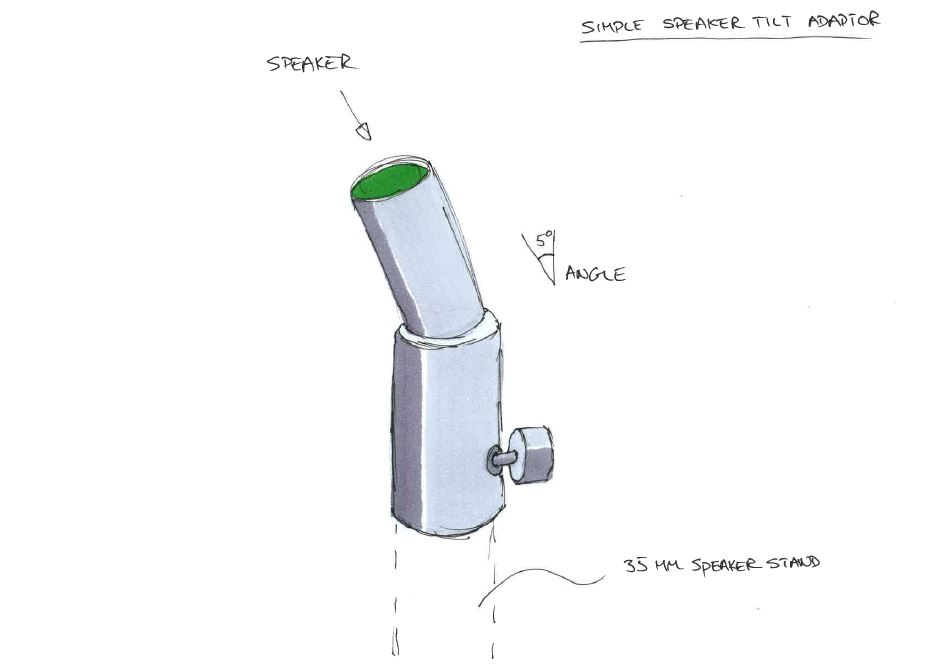
Robin Henlich: A spiral effect was noticeable on the cheaper stands in particular, which are very interchangeable. It’s about pennies at the retailers. “Oh, this retailer is selling it for five pence less”, and that eats away at the profit margin, so they go back to the manufacturer and say: “Make it even cheaper.” The manufacturer says: “Okay, we’ll use zero-eight sheet steel or another, cheaper rubber.” The result: The quality will suffer at some point to the extent that you can’t sell the product with a clear conscience anymore.
Where are you positioning the Gravity brand?
Alexander Pietschmann: We would like to position Gravity as a high quality product in the middle of the market – at an affordable price and with a decent profit margin for retailers. We would like to convince more musicians and users to invest in a sustainable product that they can enjoy for longer.
Margins are always the best argument when it comes to retailers…
Alexander Pietschmann: Yes, exactly. That is why we involve retailers in what we do. We want to work with them to create attractive opportunities to generate favourable product margins. This is difficult to achieve with regard to main products as they can be easily compared. We maintain a very collaborative relationship with our customers, especially with regard to presentation in stores.
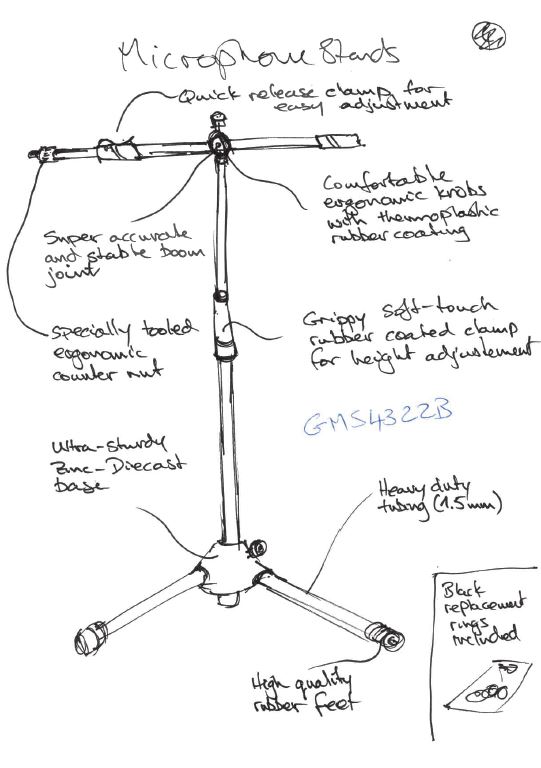
Do you identify with the idea of a one-stop shop?
Alexander Pietschmann: The entire Adam Hall range and brand portfolio in the fields of sound, light & stage represents a great advantage for many retailers because it logistically simplifies their lives and reduces their coordination costs when it comes to procurement. We also provide good service and quality. Gravity perfectly completes the range and our aim.
What role does the colour scheme play when it comes to Gravity?
Robin Henlich: The colour scheme and design language were very important to us from the outset in order to be able to distinguish ourselves from the competition. We opted for fresh green as the standard colour, because it is very natural and down to earth. The green marker ring can be removed easily if it is not to the user’s liking, and instead it can be replaced with a discreet black ring or one in an alternative colour. That’s real added value. The stands can now be personalised by colour according to taste, which also has practical advantages. For example, the drum stands are supplied with yellow rings and the mic stands for guitars with blue rings. This makes life easier for musicians and technicians during assembly and disassembly, as well as saving time. We were inspired by Sir Isaac Newton in our choice of colours (ten colours at present), even when it came to their names.
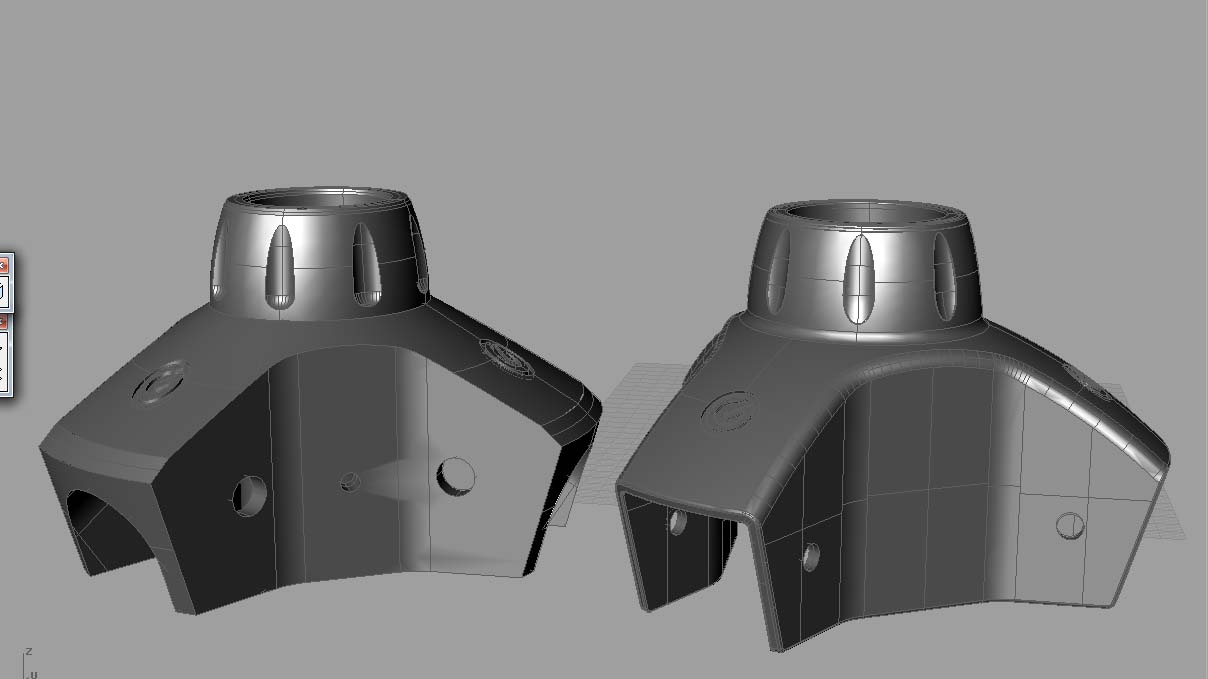
The idea makes you stand out from the competition.What qualitative USPs do the Gravity stands have?
Robin Henlich: Lots. Let’s stay with the mic stand. When it comes to the tripod’s base, for example, you can choose between plastic, combined plastic and sheet metal or aluminium die casting. We opt for the level above this: die-cast zinc. It is more stable, can be processed to a finer grade and has a lower processing temperature, which means that there is less tolerance distribution, so it is more accurate. This also means that the parts fit together better – nothing wobbles. The average pipe thicknesses on average “cheap tripods” are between 0.8 and 1.0 millimetres, whereas we opted for a thickness of 1.8 millimetres. Another example: Keyboard stands have a weak point: The joint often breaks quickly, because the rod has a hole in it at this point, which weakens the material. We have eliminated this problem by strengthening the material. So it goes on, component by component; the list is long.
Do you produce the prototypes and conduct all development activities in Germany?
Alexander Pietschmann: In recent years, we have invested heavily in research and development. In addition to designers and engineers, we use various prototyping possibilities and are increasingly using 3D printing on site. Our QA department is not to be underestimated. We now operate an in-house laboratory. We outsource the actual production to Asia, so that we can achieve a high level of quality whilst still being able to pass on the cost benefits to customers.

In today’s world, is extensive experience in production still a big advantage?
Alexander Pietschmann: That no longer has to be an advantage. There are many examples from other industries where in-house production is a disadvantage, because it is non-competitive but mainly needs to be used to full capacity. You very quickly lose sight of the customers’ needs. By working with innovative production facilities worldwide and keeping the supply chain and quality under control, you are in a strong and flexible position. Production ties up resources. We want to get around that. A strong customer focus must remain the number one priority.
You have been working with your suppliers for many years. What sort of a role does trust play in these relationships?
Alexander Pietschmann: We have cultivated a network of suppliers over many years. Again, we attach great importance to environmental standards, legal certainty and sustainability.
What is your distribution approach with regard to Gravity?
Alexander Pietschmann: We are taking a classical approach to distribution via retailers.
Your target audience is likely to be more of a younger crowd. What do you do to ensure that your potential buyers go to a music shop and buy Gravity stands in particular?
Robin Henlich: In addition to traditional advertising media such as trade fairs and print products, we have launched a strong online campaign. We try to place the products, for example through user reviews. We work with the major portals. We also use sponsorship activities, by providing equipment to bands and festivals. We are of course also active on social media.

What market share do you plan to achieve in the coming years?
Alexander Pietschmann: In Europe, our medium-term aim is to be just behind the market leader.
You have talked about Europe. Not beyond.
Alexander Pietschmann: We have had very successful product launches in non-EU countries and have garnered a lot of interest in a short amount of time in Asia. We officially introduced the range in Asia in October 2015 as part of Music China.
The whole industry is changing…
Robin Henlich: Which is not a disadvantage, of course. Change is only dangerous for a company if you do not keep up. It is a mistake to think that you can stop a change by denying its existence; it will happen with or without you. One example is online trading. You often hear stores complaining that online retailers are eating away at their business, but seldom hear of how they are rising to this challenge.
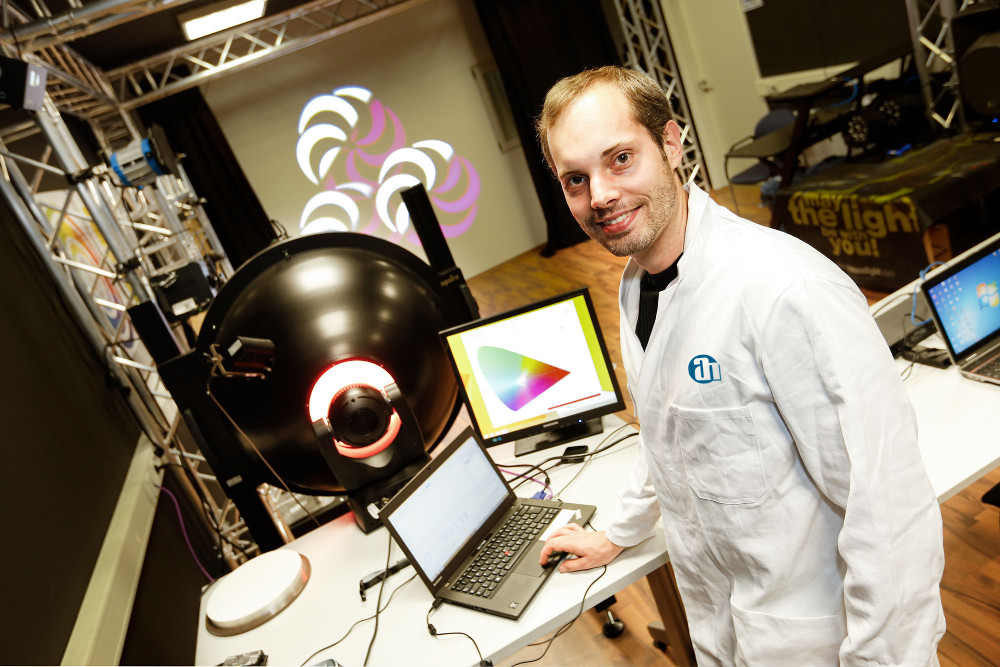
There are indeed ways of gaining customer loyalty, especially regional loyalty.
Robin Henlich: Exactly, regionality is important. One thing is certain: The concept of having our full range available online is no longer viable. But there are online concepts that are still functioning. There are good opportunities for intelligent “Click and Collect” same day solutions – this is where the online world can be networked with the regionality of the retailer. Retailers can score high on shopping experience with their attractively-designed sales rooms, live events, effective product presentation and the option that customers have of checking products’ quality and appearance by touching and feeling them.
Onto another topic: Adam Hall has recently attracted attention with its Rolling Stones cables. How did these come about?
Alexander Pietschmann: The idea was to cooperate with the most legendary rock band in the world – the Rolling Stones. We had that chance. And we took that chance, because that kind of cooperation means an enormous image boost for the company. We therefore produced a truly brilliant cable that we then furnished with the legendary Rolling Stones tongue. We are not talking about an endorsement, however. Nonetheless, high quality criteria were placed on the cables. Collaborations are certainly an interesting way to distinguish ourselves in the market. But we must not overburden ourselves with them.
Your portfolio covers all areas – lighting, sound, stage equipment…
Alexander Pietschmann: Yes, this puts us in a position to be able to think about complete solutions, which in turn lets more people enjoy good events. At Adam Hall, our ultimate aim is to reinforce ideas and emotions in our customers. You can’t do that with a stand alone.
Does one brand benefit from another?
Robin Henlich: When it comes to development, I would say that is definitely the case. This is because people work in an interdisciplinary manner. This has often helped us, for example by equipping stands with LED technology or optimising speaker use. On the other hand, mechanics is an important topic in our market and an aspect of many of our light and sound products, especially when it comes to user-friendly transportation.

The portfolio is comprehensive, the company building impressive and the ideas innovative, but despite all this, could it still be the case that Adam Hall is underestimated in the industry?
Alexander Pietschmann: Basically: We want to shine primarily through our products and not as a result of good PR. This strategy has worked well for us across Europe but is not yet doing so on a worldwide basis. One reason for this is that it takes time to build relationships and to make it clear what the Adam Hall Group represents. In order to achieve more in the future, we have brought Californian Nikke Blout (44) on board as our Global Marketing Director. Nikke is not only a very experienced and passionate marketing specialist, but also an ambitious drummer. Besides digitalisation expertise from the world of start-ups and agencies, she also brings with her international PR and brand management experience from her work for a global DAX company.
The Adam Hall Group should help to project this image…
Alexander Pietschmann:
In addition to our many smaller product innovations, Adam Hall is above all, a process innovator. The way we do business differentiates us from our competitors. International exports will start to feature in the coming years.
How will that be different to others?
Alexander Pietschmann: We don’t have any interim distributions, just direct business sales, which makes things significantly simpler when it comes to European sales management. This translates into personal contact, a wide range, high availability, fast service and good conditions and margins for retailers.
What can you say about the development of sales in recent years?
Alexander Pietschmann: It has been very positive. We consistently achieved double-digit growth in recent years. Non-retail divisions, such as events, logistics and security solutions, also contribute to our positive results.
Your team seems to be young. What is the average age of your employees?
Alexander Pietschmann: As you infer, it’s not that high. The average is 34.
So it’s a young team – but does it also have flat hierarchies?
Alexander Pietschmann: As part of the succession plan for Adam Hall, Markus Jahnel (48) and I have acquired shares in the company. In the spirit of our founder, David Kirby (65), we also place staff and the customers in the foreground. I believe that if you take good care of your own team, then they will also take good care of customers. And when our whole team takes good care of our customers, then success is sure to come. You have to give the staff plenty of space and also establish a culture of failure, i.e.: If something is not working, it’s no big deal. “Sometimes you win, sometimes you learn.” We want to make the world a little bit brighter with our solutions. This can only happen if all members of the team enjoy working with each other – and that’s certainly the case at Adam Hall.
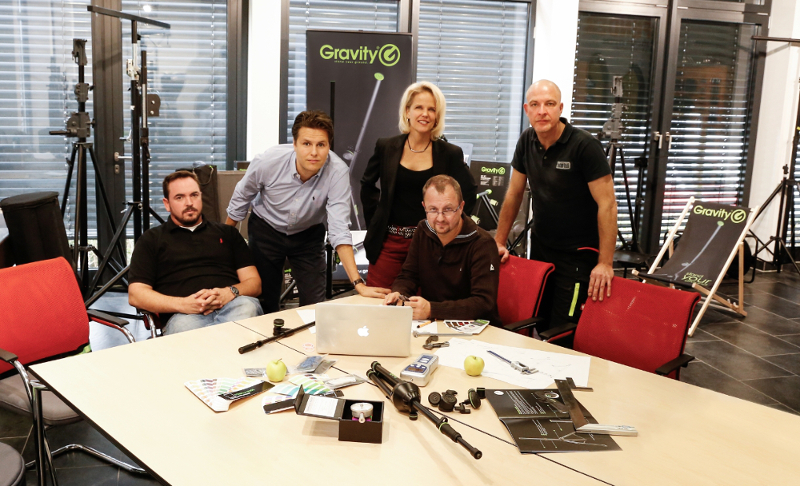
That sounds like a family atmosphere…
Robin Henlich: That’s what we have. I can always come to Alex to give constructive criticism, for example, or to make suggestions. The door is always open. And what Alex just said is important: You are allowed to fail when it comes to an idea; there are no repercussions. It is extremely motivating to try new things. There is also a good age mix, not just in the company management, but also in the various teams and groups. We also think that women’s views are important. We try to have as many women in the teams and groups as possible. They bring a different perspective to this typically male sector.
What proportion of your workforce is female?
Alexander Pietschmann: It is quite high. Well, in warehouse logistics, there aren’t so many women, which is the nature of that job. But women make up more than 50 percent of the staff in our administrative teams. That’s good for the company as a whole. If you want to sell products with emotions, you should employ people who are a little more skilled in that area.
2016 is around the corner. What are your goals for Adam Hall? What do you wish for your company?
Alexander Pietschmann: We would like to further internationalise and develop great, innovative products with which we can make more and more users happy. We will work on our international perception and positioning in order to enthuse more and more people about Adam Hall and our vision.
_______________________________________________
About Adam Hall
Adam Hall Ltd: Founded in 1975
Adam Hall Germany: Founded in 1980
Managing Directors: David Kirby, Markus Jahnel, Alexander Pietschmann
Number of employees: approx. 180
Contact: Daimlerstrasse 9, 61267 Neu-Anspach, Germany
Telephone: +49 (0)6081 94190
Internet: www.adamhall.com
E-mail: [email protected]
Adam Hall is one of the leading international companies in the professional audio, light and events industry, as well as in music stores. Adam Hall has made a name for itself, especially as a manufacturer of flight case fittings and components for the production of safe and flexible transport containers for events technology and industry. This remains a core competency to date, but is now one of many. Adam Hall develops and produces professional, innovative audio and LED lighting solutions for stages, studios, radio, fixed installation and live sound. This portfolio has made Adam Hall one of the world’s top 25 manufacturers in the field of professional events technology.
____________________________________________
Source: http://www.das-musikinstrument.de/, December 2015, Germany
Click here to find out more about Adam Hall:
http://www.adamhall.com/
http://blog.adamhall.com/en/
Leave a Comment
You must be logged in to post a comment.












